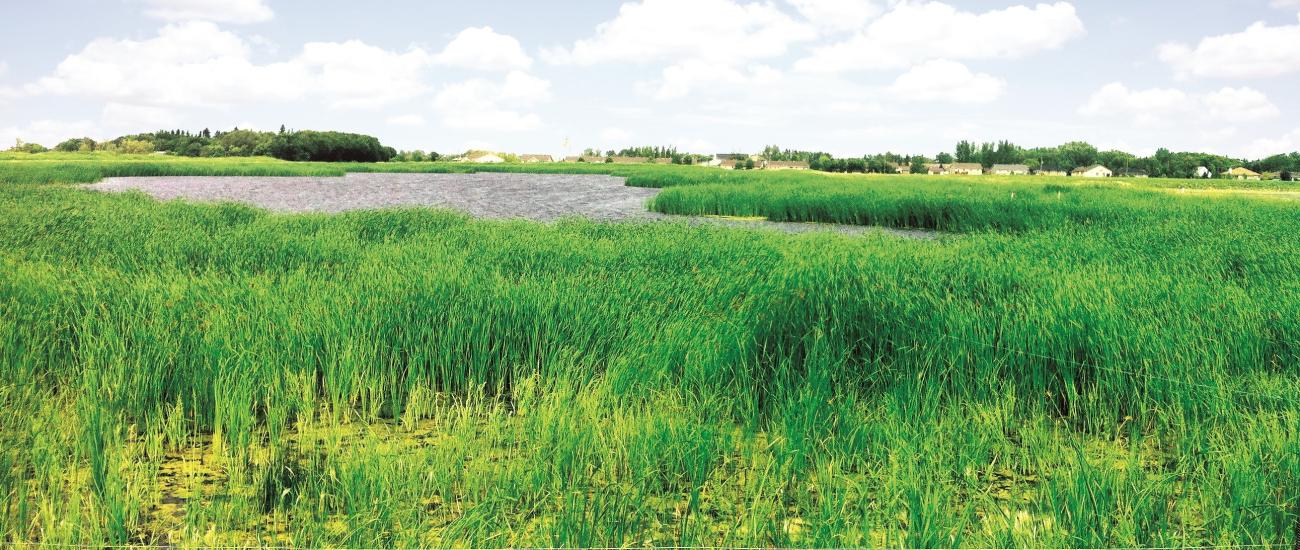A town like Niverville might appear to be a small fish in a big sea, but even the small fish can make a big impact on the world. On May 29, Niverville was recognized for its Sewage Lagoon On-Site Phytoremediation Project by receiving the Canadian Administration of Municipal Administrators (CAMA) Environment Award, in the under 20,000 population category, during CAMA’s national conference in Quebec.
“CAMA is pleased to recognize the excellent effort and best practice being demonstrated by Niverville in decommissioning a sewage lagoon that had reached the end of its life,” said Marc Landry, president of CAMA and City Manager for Moncton, New Brunswick. “This was the costly problem the town faced in 2008, but they came up with an innovative solution.”
The annual award recognizes a municipality’s achievements in creating environmentally sustainable leadership in terms of protecting the environment and combating climate change. Awards are granted to municipalities in three categories, each category based on population.
In 2005, council was faced with the dilemma of determining what to do with an aging, toxic, and inadequate lagoon. Provincial legislation provided only one option: to remove the toxic sludge and haul it away. It would need to be transferred to a certified landfill or to suitable farmland. The financial cost of such the endeavour was more than $2 million.
But council believed the environmental cost was even greater, considering the carbon footprint of hauling the soil and the devastating effect that the transferred toxins would have on agricultural land and grazing animals.
Looking for a more environmentally friendly solution, council partnered with Ducks Unlimited and Native Plant Solutions, specialists in conservation and environmental sciences. Together, the group decided that phytoremediation—the introduction to the site of natural detoxifying plants and grasses—could be the answer, but it would require time and patience.
The unconventional plan was denied by the province. But eventually, soil science experts were brought in from the University of Manitoba. Together, they appealed the province’s decision and this time the province admitted that Niverville might be on to something.
Council and their partners wasted no time in carrying out the experiment. Plants were introduced and, over the years, soil samples taken. The project brought in land reclamation experts and soil scientists from all over North America.
By 2014, the province declared the experiment a resounding success and bestowed upon Niverville the Manitoba Excellence in Sustainability Award.
The project didn’t end there. Since that time, council has turned the area into a wetland site with an interpretive centre and walking paths. It’s becoming a place where families can witness nature and environmental action at its finest.
“This award reinforces the commitment of town council to being an environmentally responsible and sustainable community,” says Mayor Myron Dyck. “It signifies us as a leader in matters of the environment on the national stage and provides us with opportunities to share our story with other community leaders who may also be looking at a similar project in their municipality.”
Thanks to examples such as this and organizations like CAMA, other municipalities across Canada are stepping up to the plate.
“We are extremely pleased with the quality and scope of the 35 award submissions received for this year’s CAMA Awards of Excellence,” said Louis Coutinho, Chair for the 2019 CAMA Awards Jury. “Congratulations to the winners and all those who took the time to enter a submission.”


